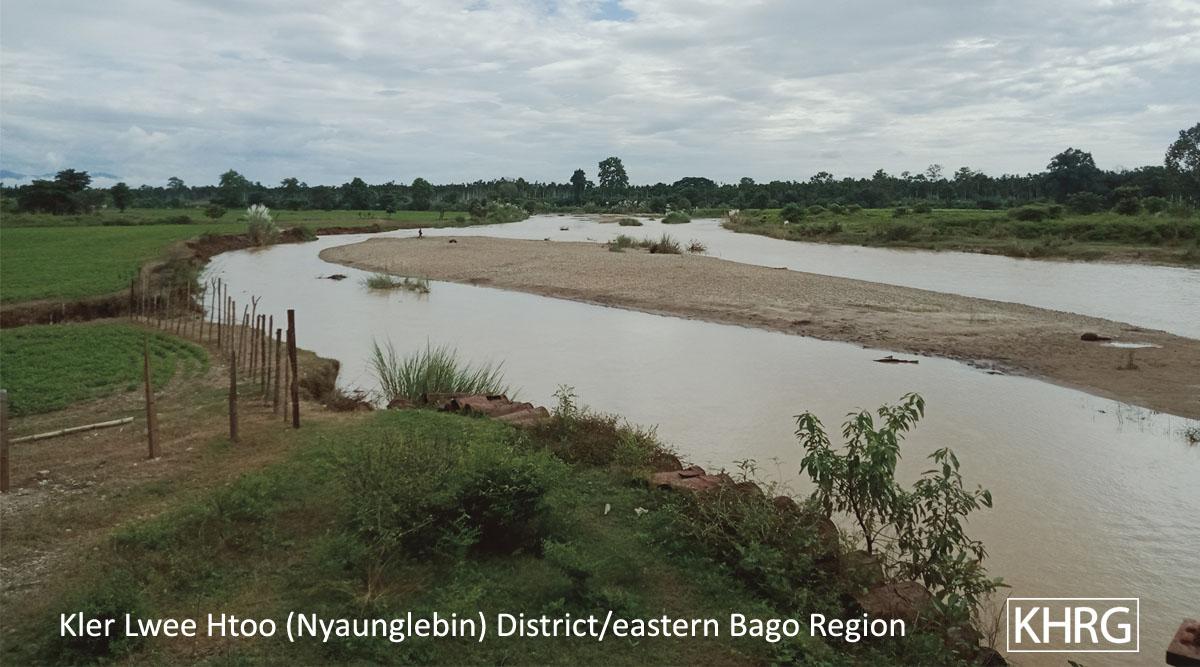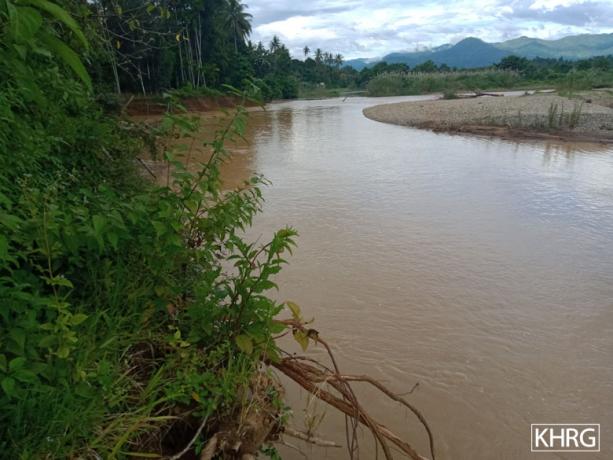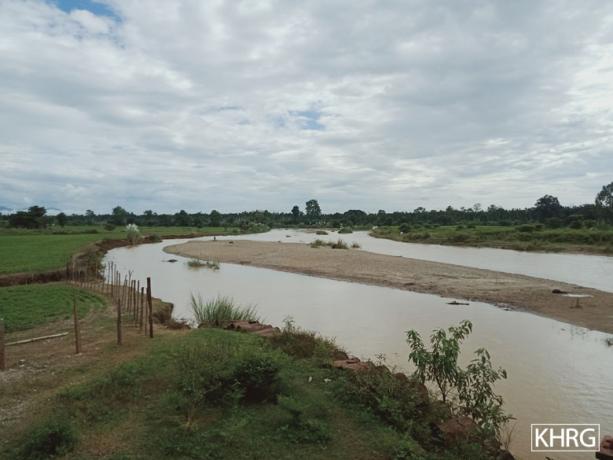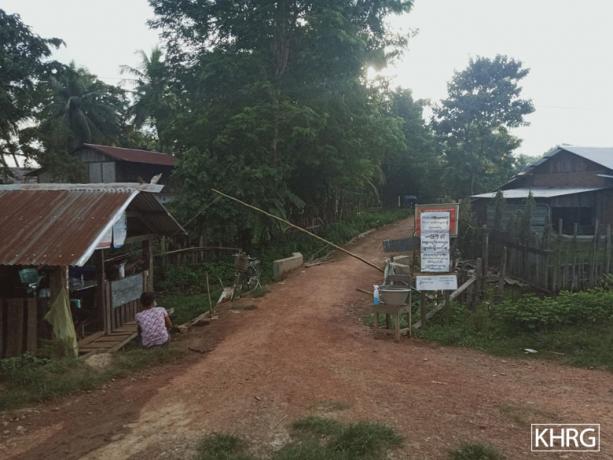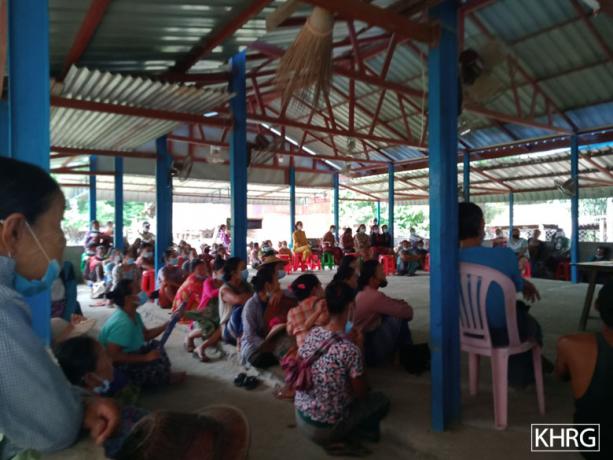This Situation Update describes events that occurred in Moo [Mone] Township, Kler Lwee Htoo [Nyaunglebin] District between August 2020 and October 2020. Gold mining activities along the Klaw Myaw, Puh Loh Kloh and Kaw Ka Loh Kloh rivers have caused water pollution and now threaten the livelihood of entire villages. In government-defined Kyaukkyi Township, vulnerable households received financial support from the Myanmar government to cope with the difficulties caused by the COVID-19[1] pandemic, but local authorities diverted some of the support money. In H--- village tract,[2] local villagers were required to pay for the installation of electric posts even though they cannot afford this expense.[3]
Introduction
This situation update was written between August and October 2020. It is based on information from Moo (Mone) Township. It includes topics such as gold mining; financial support by the Myanmar government and other COVID-19 updates; and access to electricity.
Gold mining activities
Since 2015, businessmen have been conducting gold mining activities along the Klaw Myaw and Puh Loh Kloh rivers, O--- village tract, Moo Township. They received permission from the Karen National Union (KNU)[4] Moo Township authorities to mine gold in the area. [In June 2020,] the H--- and E--- village tract administrators reported about the damages caused by the gold mining activities to the KNU Township authorities. They stressed that the local villagers’ farmland needed to be protected from the environmental damage caused by the gold mining activities. The village tract administrators told KHRG that that their initial report had remained unanswered.
Local villagers now face difficulties, as the gold mining activities have polluted rivers and resulted in the destruction of paddies [rice crops]. The villagers have been complaining about these issues since September 2020. Water pollution also resulted in the extinction of the local aquatic fauna. Saw[5] P---, the E--- village tract administrator, explained that he used to catch fish in the river and that to sell them for his livelihood. Since 2019, it has been difficult for him to catch enough fish for a single meal.
As local villagers were facing an increase in water pollution as a result of the gold mining activities, the H---, W---, A--- and E--- village tract administrators decided to form a special committee called the Nee Htaw Thaw Committee. The committee held a meeting in W--- village tract on October 19th 2020. During the meeting, they [local leaders] discussed about the difficulties the villagers were facing because of the water pollution. They agreed to write a complaint letter to the KNU Moo Township authorities. The complaint letter was sent on October 25th 2020. It was signed by over 700 villagers. [On October 28th, the KNU Moo Township office sent a response letter to the local village tract authorities, informing them that they had already ordered the gold mining activities to stop on October 5th. However, the gold mining activities continued after October 5th 2020. According to a KHRG researcher, the businessmen were later granted permission to continue their gold mining activities until May 2021.]
There is also a new gold mining operation along the Kaw Ka Loh Kloh river (Khar Khar Doe Chaung), K--- village tract, Moo Township. This new gold mining operation started on August 30th 2020. It is currently on-going. The businessmen involved in these gold mining activities are:
- Min Min Lwin from Moo Town
- Daw Myint Yee from Yay Twin Phyu village
- Ka Kah from Moo Town
- Kayin Pu from Yay Twin Phyu village
- Maung Seing Kaung from Th’Pay Nyoo village
- Aye Lwin from Aung Chan Thar village
More businessmen are involved in the gold mining activities, but KHRG was not able to obtain their names. The businessmen are working together with local Karen National Liberation Army (KNLA)[6] and KNU authorities [notably Commander Kyaw Kyaw from KNLA Brigade #3, Battalion #8, Company #3]. They received permission from the Moo Township KNU authorities to conduct their gold mining activities.
These new gold mining activities have resulted in water pollution, which created difficulties for the villagers. Villagers who live along the Traw Loh Kloh river [which is connected to the Kaw Ka Loh Kloh river] rely on its water to raise their livestock, so the current situation threatens their livelihoods. These villagers also worry for their health, and they told KHRG that fish were disappearing from the river. They explained that thousands of acres of betel nut and other plantations located near the river will be damaged if the gold mining activity continues.
Local villagers and village leaders sent a complaint letter to the Myanmar government Kyaukkyi Township authorities on September 17th 2020 to report about the situation they are facing. They also sent a complaint letter to the Sit Tuang Than Sin Network Group [a local community-based organisation] on September 28th 2020. Both letters were signed by 679 villagers.
[According to a KHRG researcher, gold mining operations in the wider area now cover a surface of over 1,000 acres.]
Financial support from the Myanmar government
[Between August and October 2020,] the Myanmar government provided financial support to the civilians living under government control in the Plaw area, Moo Township to help them cope with the economic difficulties caused by the COVID-19 pandemic. This government support came from [was distributed by] the township [authorities]. The government support for Kyaukkyi Township, Bago Region [the Myanmar government administrative division in which the Plaw area is included] was given to [and distributed by] U[7] Kyaw Thu, the administrator of Kyaukkyi Township’s General Administration Department. This financial support was only provided to households in real need. [According to the government policy,] if there are 100 households, only 35 need to be chosen [only 35% of all households will receive financial support]. [It seems that villagers need to apply for financial support with the local leaders, who then decide which households will benefit from it. Local leaders then take the list of beneficiaries to the Myanmar government authorities to receive the support money. Only villagers with household registration documents are eligible for support.]
Villagers from M--- village, T--- village tract, Plaw area, Moo Township told KHRG that the village tract administrator, U Myo Win and the village leaders did not explain well about the financial support [they did not tell the villagers how much they would receive]. […] They also collected money from the villagers who received financial support [households eligible for support were supposed to receive 20,000 kyats [USD 14.19],[8] but they only received 5,000 kyats [USD 3.55]. The local leaders kept the rest of the money]. Villagers were dissatisfied about it so they looked for a solution to this problem. Daw[9] Y--- from M--- village contacted KHRG to document this case.
On October 2nd 2020, a KHRG researcher interviewed [local villagers] and [took the matter to the village leaders]. On October 8th 2020, U Myo Win asked local villagers to meet with him at the village tract office. He explained about the situation and [apologised to the] villagers who were not satisfied. Village leaders said to the villagers that they had kept some of the money to cover the fees associated with transportation, printing travel letters and food [they are referring to the costs of travelling to the township office to pick up the support money]. Some villagers were satisfied by this explanation, but some were not [but they could not do anything to try and get the rest of the money]. The local village head also explained that not all civilians were eligible to benefit from the government financial support. This situation has created problems [misunderstandings] between villagers and village leaders.
This did not only happen in M--- village, but in other locations of [government-defined] Kyaukky Township. Some village leaders do not manage the financial support fairly. In H--- village tract, however, local leaders collected the support money and distributed it in full to every eligible household.
COVID-19 update
The number of COVID-19 infections increased from September to October 2020. Because of the increase in cases, both the Myanmar government and the KNU formed COVID-19 prevention committees and decided to implement more rules [restrictions]. On October 17th 2020, the KNU COVID-19 prevention committee decided to ban meetings, events, worshipping services, visits to monasteries and wedding ceremonies in all the districts.
The Myanmar government set up a curfew from 6 pm to 6 am and instructed the civilians to wear a mask whenever they go out. Villagers in Moo Township are not allowed to go to other townships. If villagers really need to go [to other township], they have to get a travel letter from the village administrator. Guests [outsiders] are not allowed to visit local villages. Buying and selling activities were also banned in the villages [outsiders cannot enter the villages and villagers cannot leave to buy and sell things].
Because of the COVID-19 restrictions, villagers from K’Hser Klah and Plaw Poo areas, Moo Township, are facing difficulties. Travel restrictions have translated into livelihood challenges, and they are now banned from celebrating cultural events and engaging in worshipping activities. To prevent the spread of COVID-19, both the Myanmar government and the KNU set up screening checkpoint in the following locations:
1. Mah Lah Daw village, Maw Ker Tha Per Hkoh village tract.
2. Myaw Oo village, Kwee Doh Hkoh village.
3. Maw Lay place, Kwee Doh Hkoh village tract.
4. Between Muh Theh and Hsaw Mee Loo, Ler Htoo Loo place.
They [Myanmar government] also arranged quarantine centres in Moo Township, Hsaw Htee and Ler Doh townships [near the Myanmar government township office].
[Because of the restrictions,] it is really difficulty for local villagers to travel for work. The rules and restrictions also created misunderstandings and tensions between the villagers and the local village leaders [notably because the level of implementation of these rules can vary from one area to the next].
Access to electricity
The Myanmar government has plans to provide electricity to H--- and N--- villages, H--- village tract, Moo Township in 2021. [The government will install electric posts over a distance of around 300 miles along the main road from Z--- village, Ler Doh Township to H--- village.] The [H--- and N---] village leaders were told that electric posts would only be installed along the main road. The government will not take responsibility for installing the electric posts along the roads inside the villages. The villagers themselves will have to pay for all the expenses related to the installation of electric posts and cables inside their villages.
The village leaders from H--- village and Z--- village formed an electricity committee in September 2020. From September 25th to 26th 2020, the electricity committee held a meeting with villagers from each section. [Village leaders] informed the villagers that the government will only take responsibility [for the installation of electric posts along] the main road; [and told the villagers they] will have to pay for the electric posts and cables [inside the village]. The villagers who attended the meeting did not want to agree to it, but they were afraid to speak out [they feared the village leaders would scold them]. A few villagers were interested in this plan, but a lot of people were not interested as they could not afford to pay.
Villagers in H--- village have to pay over 56,000,000 kyats [USD 39,719.5]. The electricity committee and local village leaders divided the villagers into three categories [based on their income]. Villagers in the first category have to give 200,000 kyats [USD 141.86]. Villagers in the second category have to give 150,000 kyats [USD 106.39] and people in difficulty [in the third category] have to give 100,000 kyats [USD 70.93]. [The obligation to pay for the installation of electric posts] became a burden and resulted in difficulties for the villagers. [According to an update provided by KHRG researchers, the local leaders tried to collect the money on three occasions, but there are still villagers who could not pay.
Footnotes:
[1] Coronavirus disease 2019 (COVID‑19) is an infectious disease caused by severe acute respiratory syndrome coronavirus 2 (SARS-CoV-2). It was first identified in December 2019 in China, and has resulted in an on-going pandemic. For more information, see WHO, “Coronavirus disease (COVID-19) pandemic”.
[2] A village tract is an administrative unit of between five and 20 villages in a local area, often centred on a large village.
[3] The present document is based on information received in October 2020. It was provided by a community member in Kler Lwee Htoo District who has been trained by KHRG to monitor human rights conditions on the ground. The names of the victims, their photos and the exact locations are censored for security reasons. The parts in square brackets are explanations added by KHRG.
[4] The Karen National Union (KNU) is the main Karen political organisation. It was established in 1947 and has been in conflict with the Burma/Myanmar government since 1949. The KNU wields power across large areas of Southeast Myanmar and has been calling for the creation of a democratic federal system since 1976. Although it signed the Nationwide Ceasefire Agreement in 2015, relations with the government remain tense.
[5] Saw is a S'gaw Karen male honorific title used before a person's name.
[6] The Karen National Liberation Army is the armed wing of the Karen National Union.
[7] U is a Burmese title used for elder men, used before their name.
[8] All conversion estimates for the kyat in this report are based on the March 4th 2021 official market rate.
[9] Daw is a Burmese female honorific title used before a person's name.

